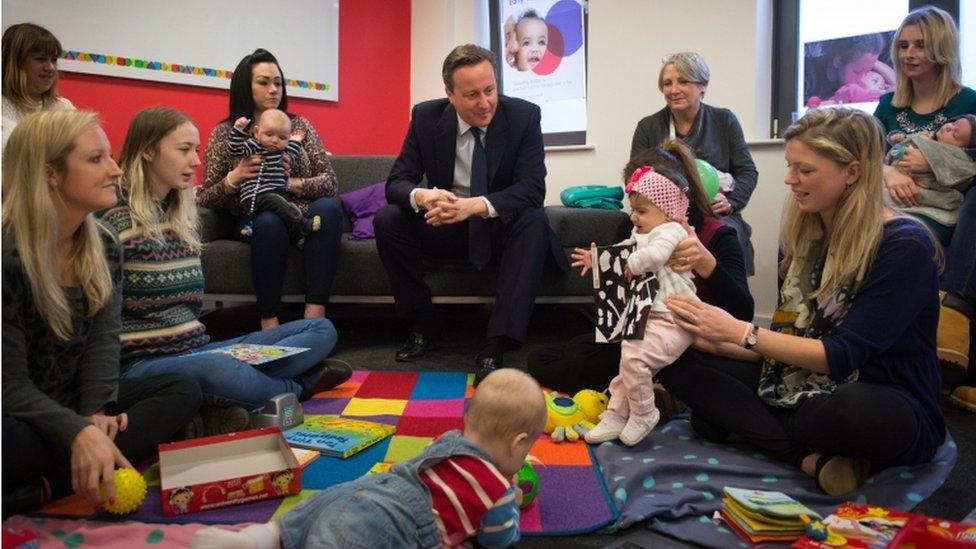David Cameron pledges 'assault on poverty' with social reforms
- Published

David Cameron has promised an "all-out assault on poverty" with a series of social reforms to include better mental health services and mentoring schemes.
The PM said new mothers and teenagers with anorexia were among those who would benefit from improved services.
He also promised to flatten "sink estates", help families save, and more funding for parenting classes.
Labour said the PM had previously cut mental health spending, and the new pledges were "too little, too late".
Mr Cameron defended controversial education reforms, and praised "Tiger Mothers" who pushed children to succeed.
It was "the precise opposite of the 'all must have prizes' culture", he said, insisting that "children thrive on high expectation".
Setting out what he called a "lifecycle approach" at the charity Family Action in north London, Mr Cameron said many people now experienced "paucity of opportunity" rather than material poverty - although he acknowledged some of the latter did still exist.
Reforms would focus on four key areas - family life and early years; education; equal opportunity; and treatable problems such as mental health and addiction.
Watch: David Cameron on mental health spending plans and ministers' freedom on EU referendum
Improving family life was "the best anti-poverty measure ever", he said, promising to double funding for relationship counselling and to provide careers guidance and mentors, costing £70m over the next five years.
He also announced a relaunch of a coalition policy of parenting classes, which was criticised after a low take-up in a pilot scheme.
He said he wanted it to become "normal, even aspirational, to attend parenting courses", and his strategy would examine voucher schemes or other incentives to encourage people to attend.
The government also wanted to help build families' financial resilience, and planned to bring forward a scheme to help people on low incomes save, he said, adding that full details would be announced in the next Budget.
On education, he said state schools must learn from "elite schools", and teach character virtues and resilience as well as knowledge.
This included teaching "curiosity, honesty, perseverance and service", as well as the value of "hard work and concentration, and coming back from failure - the Tiger Mother's battle hymn".

Among measure aimed at tackling poverty, David Cameron has announced plans to flatten so-called "sink estates"
The government would provide £1bn over four years for the National Citizen Service in England and Northern Ireland to show young people "the power of public service, not just self service", he said.
He hoped it would cover 60% of all 16 year olds, and become the largest scheme of its kind in Europe, he said.
On improving opportunities for all, he promised cash for a mentoring scheme targeting pupils at risk of dropping out of school, and plans to spend £140m to tear down "brutal" housing estates in England which he said "design crime in, rather than design crime out".
Mr Cameron also used his speech to promise action on "treatable problems", including mental illnesses and addiction.
Calling for a "more mature" conversation about mental health, he said new mothers and teenagers with anorexia would be among those to benefit from £1bn extra cash that was allocated in the Autumn Statement.
The PM also pledged more psychiatric support in hospital A&E departments, and for community services.
'Well short'
The specific measures on mental health, which will apply in England only, include:
£290m up to 2020 to give 30,000 more women each year access to specialist mental health care before and after giving birth, including through classes
£247m over the next five years so that every hospital has mental services in their Accident and Emergency unit
A new waiting time target for teenagers with eating disorders, which will track the number of patients being seen within a month of being referred
A target that at least half of people experiencing psychosis for the first time should be treated within two weeks
Labour said mental health spending had dropped on David Cameron's watch, and the new announcements were "too little, too late".
Lucy Powell, Labour's shadow education secretary, said David Cameron was "fond of making speeches about families but absolutely woeful in following through".
The closure of many Sure Start children's centres, and "huge cuts to family support services, tax credit and welfare changes" had left "many, many more families in crisis", she said.
Lib Dem spokesman Norman Lamb, who was a health minister during the coalition government, said the PM's mental health plans "fell well short" of the ambitions set out by his party and the Conservatives in 2014.
"It will leave a disparity between physical health and mental health at the heart of our NHS. That is morally wrong and economically stupid," he said.
- Published10 January 2016

- Published9 October 2015

- Published22 October 2015
